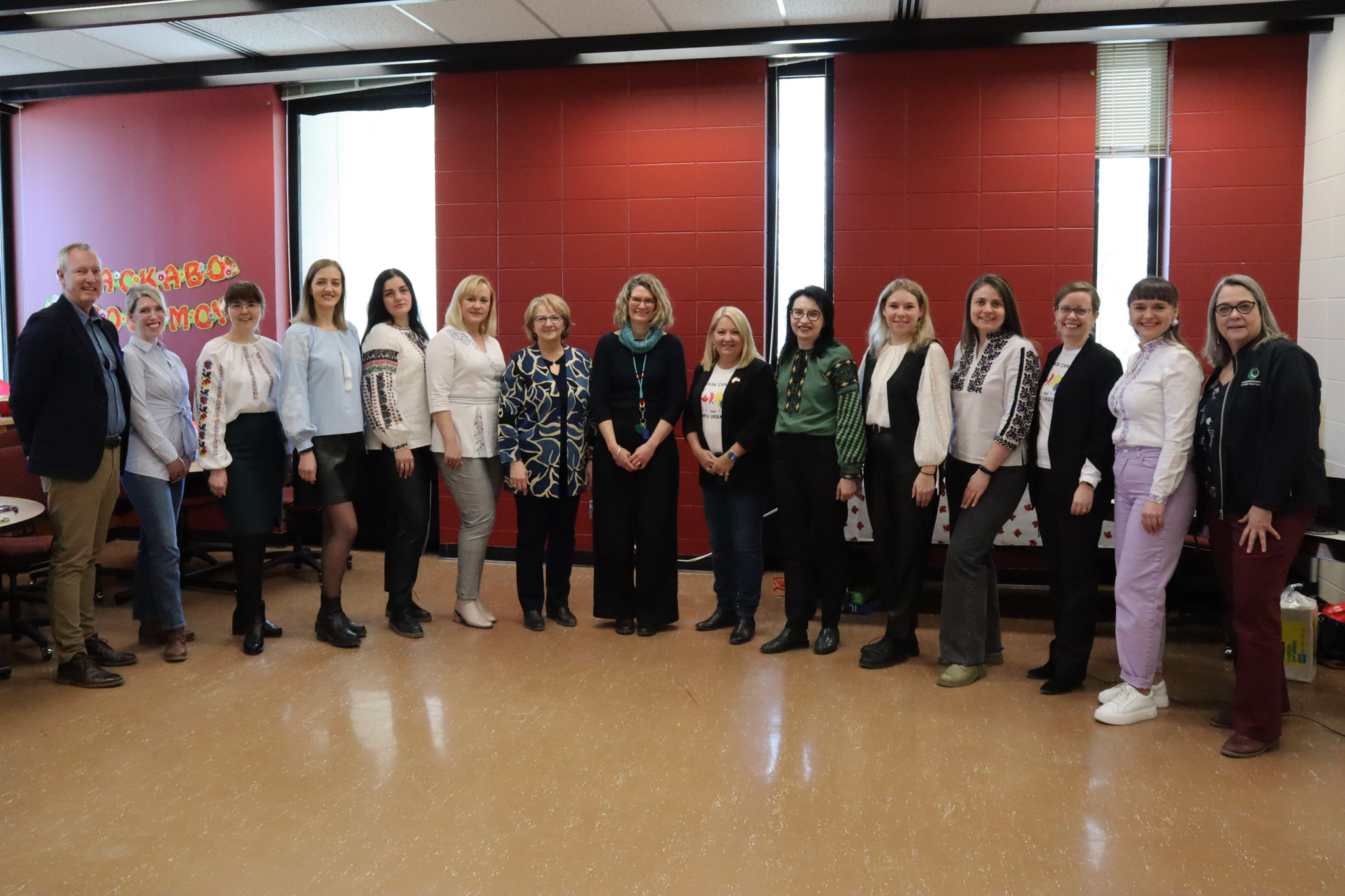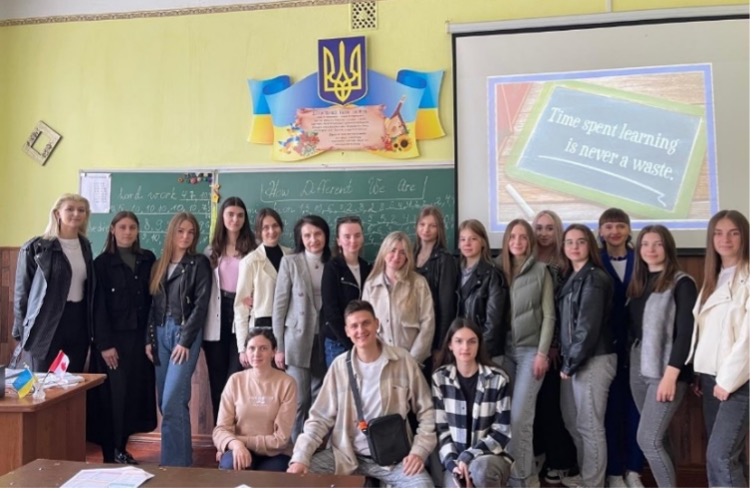
The impact of Canadian professional learning on English language teaching in Ukraine
Reflecting on the three-week English language skills course arranged between the University of Saskatchewan’s (USask) College of Education and Ukraine’s Ternopil National Pedagogical University (TNPU).
By Nadia ProkopchukOne year ago, seven English language teachers, a university professor, and two education officials from Ternopil, Ukraine arrived in Saskatoon on March 3, 2024, during one of the worst snowstorms of the year. Despite the severe weather and the arduous journey by bus and train from Ukraine to Poland prior to boarding their flights to Canada, the group of 10 women were happy to arrive at their destination. Following the invasion of Ukraine on February 24, 2022, most of the country’s men had been called to serve on the front lines, while women filled critical roles in various occupations, including the education sector. This group of female educators and administrators received special permission to travel out of the country to Saskatchewan. They were looking forward to a short reprieve from the pressures of living and working in a country at war. Air sirens, drones, and days spent teaching in bomb shelters had become their daily reality.
The delegation was invited to take part in a three-week educational program arranged between USask’s College of Education and Ternopil. Funding for travel was arranged by Ternopil Oblast Administration (Olha Khoma, Oblast education director) and the City of Ternopil (Olha Pokhylyak, city education director). The initiative was organized through the efforts of Dr. Vicki Squires (PhD), associate dean, research, Graduate Support and International Initiatives, working together with a dedicated college team from the Saskatchewan Education Leadership Unit (SELU), comprised of Greg McJannet, Megan Fillatre, Holly Mayes and Nadia Prokopchuk. Dr. Olena Huzar (PhD), a professor at the Ternopil National Pedagogical University, was the program co-ordinator in Ukraine. A grant from USask, plus financial support from various community groups, made this international education initiative possible.
A robust professional learning program comprised of daily course instruction, school visits, community excursions, campus meetings, and cultural experiences was greatly appreciated by this delegation of educators and administrators.
While in Saskatoon, the English language teachers were eager to improve their English language skills and their knowledge of North American teaching methodologies. A three-week course titled “Current methods in teaching English as a global language”, led by language teaching specialist Nadia Prokopchuk, proved to be of critical importance to the teachers, in light of priority initiatives within Ukraine’s Ministry of Education. All K-12 schools have a mandate to teach English as a foreign language in preparation for Ukraine’s assent into the European Union. In 2024, Ukraine’s government also adopted a law recognizing English as a critical language for international and diplomatic communication. Specific jobs that require English proficiency have been identified and posted.
One year has passed since the international group was in Saskatoon, and sadly, the war continues in Ukraine. Women in the education sector continue to play a vital role in ensuring that the country’s youth have access to educational, psychological, and emotional support. Teaching conditions have not improved, and the skies continue to be unsafe due to drone attacks by Russia. Despite these circumstances, Ukraine’s teachers remain resilient and hopeful that better days are ahead. They believe that the future holds promise for their students.
A few short weeks after their return to Ukraine, the 10 program participants arranged meetings with English language teaching colleagues, school administrators, and education officials from the Ternopil region, to share what they had learned and experienced while in Canada. They presented a comprehensive overview of the professional learning program at USask, as well as insights following their observations in local schools. Following these presentations, they fielded many questions from teaching colleagues about language teaching methodologies, approaches, and strategies for student engagement in language learning.
College of Education organizers have kept in touch with Ternopil program participants throughout the past year. Recently, the teachers were asked to share some reflections on their learning by responding to the following question: How did your professional learning experiences at the College of Education impact your classroom teaching practices during the past year?
Halyna Bilous: “Now I pay more attention to teaching vocabulary. I choose the most important words I want my students to remember and try to teach them using different techniques, so that students can see these words in different contexts as many times as possible. I pay more attention to pair work, so that students get support from their peers. Most of all I like and use a Think-Pair-Share strategy. It is very easy to use, and it really works with my students. Sometimes I ask them to share ideas in pairs, then in groups of four and after that, we summarize all the ideas with the whole class in English.”
Mariana Marets: “…modules about different kinds of instructions and instructional strategies were the most valuable for my teaching practice. I tried to implement them immediately after coming back to Ukraine. And during our teaching seminars where we shared our Canadian experience, my colleagues appreciated them most of all. Visiting various schools, observing teachers and students, seeing the process of learning in progress, was definitely one of the highlights of the project. And last but not least was the cultural component. Visiting museums and concerts, taking part in celebrating of St. Patrick’s Day, watching the hockey competition and even shopping made me feel relaxed and safe, like an ordinary person in an ordinary world, without war and despair.”
Oksana Horishna: “One of the most useful methodologies I learned was CLIL (Content and Language Integrated Learning), which allows for combining foreign language learning with other subjects. In my lessons, I use CLIL to study topics such as science or geography, where students not only learn specialized vocabulary but also grasp the material through the language. For example, we might study ecosystems in natural science lessons, discussing different habitats in English. This approach helps students better understand the content while simultaneously developing their language skills. Integrating new methodologies has made my lessons more interactive and effective. I’ve noticed that students have become more open, engaged and motivated to learn. They enjoy working in groups, actively using new language structures and growing in their knowledge. This allows me not only to achieve high teaching results, but also to create an atmosphere where students feel confident and comfortable.”
Olena Aksak: “Experience obtained in Canada has made a great influence on my teaching in Ukraine. First and foremost, my language fluency has improved a lot, and I have built professional confidence as a teacher of English. The Culturally Responsive Teaching approach was eye-opening for me both when I was in Canada and now for my students. I wasn’t aware of it in such a fundamental way as I am now.”
Olena Petryk: “The emphasis on immersion and communicative learning in Canadian schools has influenced my teaching, making lessons more student-centered … I strive to provide materials that match students’ individual needs, but motivation and self-discipline remain key difficulties … Despite these challenges, the project has profoundly shaped my teaching, reinforcing my belief in interactive learning. The collaboration with fellow Ukrainian teachers from the project remains invaluable. I sincerely appreciate the knowledge and support shared by the organizers and Canadian educators. This experience has encouraged me to be more flexible, creative and student-focused, and I continue to implement new approaches while adapting them to my context.”
Olesya Chekanova: I learned so much new information about methodology. In Canada, we saw different schools … I hope that our children will have such a calm studying [atmosphere] as children in Canada … it was so amazing to learn about Canadian culture and discover a lot of information about history, culture, and the people of Canada.
Olia Vasko: We have become more confident and skilled, having obtained useful information in Canada. I really appreciate the sociocultural studies that were part of our educational program … Students can understand more deeply if the knowledge is associated with some emotional side or positive feelings.

New knowledge on language teaching methodologies has also impacted pre-service teachers at TNPU. As an extension of the international program at the College of Education, Dr. Olena Huzar delivered the college’s language teaching course to her class of pre-service elementary teachers, in preparation for their future work as English language teachers. Dr. Huzar shared her reflections on the effectiveness of the course.
Dr. Huzar (PhD): “I would like to highlight several aspects of the course that have had a significant impact on my teaching practice, particularly upon my return to teaching the course Methodology of Teaching English for students at the Faculty of Primary Education at Ternopil National Pedagogical University.
First and foremost, I have extensively integrated the CLIL methodology, which allows for the development of both linguistic and subject-specific skills. In this approach, language is not only the goal but also a means of instruction. I designed my assignments in a way that encouraged students to develop analytical thinking alongside their language competence. The course incorporated project-based learning, group discussions, experiments, and case studies, while also integrating multiple disciplines—such as discussing global environmental issues in English.
Another noteworthy methodological aspect was the application of Culturally Responsive Teaching (CRT), an approach that acknowledges students' cultural and linguistic background to promote inclusivity. By implementing CRT, students were able to see connections between course content and their lived experiences. This reduced language learning anxiety and improved their ability to think more broadly about cultural diversity.
The feedback from students about course content was overwhelmingly positive. The students also appreciated observing new methodologies in action. We spent time in Ternopil schools, observing the teaching skills of English teachers who had completed the course in Saskatoon.”
Dr. Vicki Squires (PhD), associate dean, research, Graduate Support and International Initiatives, hopes that this collaboration with TNPU will continue to benefit Ukraine’s teachers and pre-service teachers in amplifying the use of English throughout their country.
“We look forward to a time of peace in Ukraine where we can further our collaborations as well as opportunities for faculty, staff and student exchange," said Squires. “This inspiring project has had a tremendous impact on our community, our team and our colleagues here and in Ukraine.”
Dr. Julia Paulson (PhD), dean of the College of Education, is concerned about the ongoing situation in Ukraine, particularly the toll of war on all educators and students who are learning in incredibly challenging circumstances.
“We are grateful for our long-term partnerships with colleagues in Ukraine, including through the renewed Memorandum of Understanding between TNPU and USask,” said Paulson. “TNPU has been a wonderful partner supporting language exchanges for USask students over many years and we are pleased to be able to help meet their needs at this challenging time, by supporting the important role that English language learning plays in working towards a peaceful and prosperous Ukraine.”
For more information about this College of Education international program, see the following article: Teaching in a country at war.

